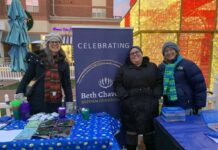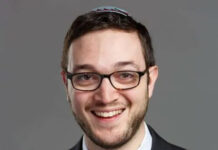
Next week, Rabbi Shira Stutman, 48, leaves Sixth & I Historic Synagogue in Washington, after 11 years. Ordained by the Reconstructionist Rabbinical College, Stutman was best known for working with interfaith couples and people considering becoming Jewish.
Arriving at Sixth & I in 2010, “Stutman set about turning the place into a sort of non-denominational Chabad for the unaffiliated,” Tablet magazine wrote in 2013, when it named her a “notable rabbi.” That year, the Forward named her one of America’s most inspiring rabbis.
We asked her what has been notable and inspiring about her years at Sixth & I.
What are your future plans?
I wish I knew. I am writing a book about interfaith couples. I’m calling them hybrid couples and so I’m using a lot of what I’ve learned from these couples over the years. God only knows, I mean that quite literally. It was time for me to leave Sixth & I and I don’t know what I’m going to be doing next. But I’m really optimistic and I’m very excited to see what the future holds.
Can you talk to me about your practice of “radical welcoming?”
Jewish communities can often not be perceived as or actually be welcoming to outsiders. And I think that comes from the fact that Jews are a traumatized people, that we don’t trust outsiders, especially for outsiders who look different than what we imagined a white Ashkenazi Jew looks like. There is a level of distrust.
One of the things that we tried to do at Sixth & I is begin with trust and begin with welcoming and begin with “You’re accepted here, no matter who you are, no matter what part of the journey you’re on.” It’s a philosophy but it’s also very practical. We never assume that someone who walks into our building is Jewish. We never assume that someone can read Hebrew or know something about Judaism. We try not to start with Jewish geography, because maybe they never went to Jewish summer camp.
If someone comes to Sixth & I for a book talk or conference, if they consider it a Jewish act because they’re in a synagogue building, then we consider it a Jewish act because they’re in a synagogue building.
What is one of your favorite memories as senior rabbi at Sixth & I?
There are too many memories to count. But when I picture Sixth & I, I will picture what it feels like to have the room filled with people at Shabbat services. With tremendous energy in the room. Lots and lots of young people singing and just sort of learning what it means to live in a Jewish community as adults. It makes me optimistic and hopeful, not just for the future, but also for what we’re building right now.
What are you most proud of?
I think one of our real sort of superpowers these last 11 years has been to keep our eyes open to the needs of people. We sort of have our finger on the pulse of the Zeitgeist. It has never been about teaching Judaism, first and foremost, it has been about what do people need. And how can Judaism help to give them what it is that they need.
And I think that turns on its head a little bit of the way that a lot of the Jewish community worked in the 20th and early 21st century, which is “Judaism is here and people should come to it.” We believe that we should go to the people and figure out what they need. We don’t literally go to the people; they have to come to us, we’re in a building. But sort of spiritually and intellectually, we try to go to where they are.
One of our most popular programs, for instance, is our interfaith couples workshop to talk about issues that are most pressing for them. So instead of me dictating to the couples what their religious and spiritual life should look like, we ask the couples to write their own case studies about what they’re struggling with and then the couples themselves help discuss possible solutions.
What is the biggest lesson you’ve learned from the people here?
So much of what I am as a rabbi is because of the people at Sixth & I. When I started in the rabbinate, did I want all interfaith couples to raise nice Jewish children? One hundred percent I did. Did I want Jews to be married to each other? One hundred percent I did.
Over my years of Sixth & I, I’ve learned that interfaith couples can be some of the biggest blessings to the Jewish community, for instance, and that I don’t have a right to dictate what other people should do with their lives. I’ve worked with converts choosing Judaism, who have reopened my eyes to the beauty that is Jewish life and living. I’ve accompanied people who have had to bury loved ones. I’ve accompanied family members who have had to bury young people who should still be alive and learned so much about maintaining hope and allowing yourself to be bereft in difficult moments. So everything about being a rabbi, I have learned from my congregants.





